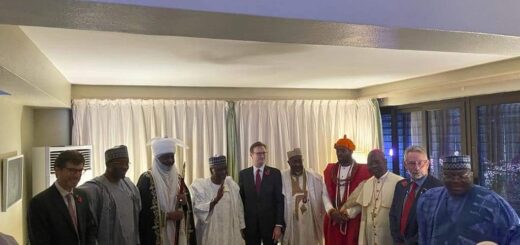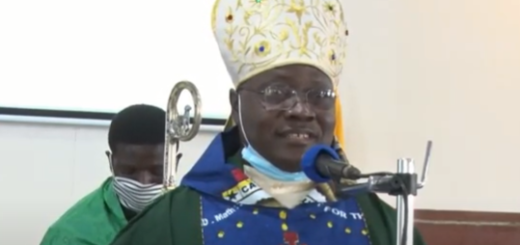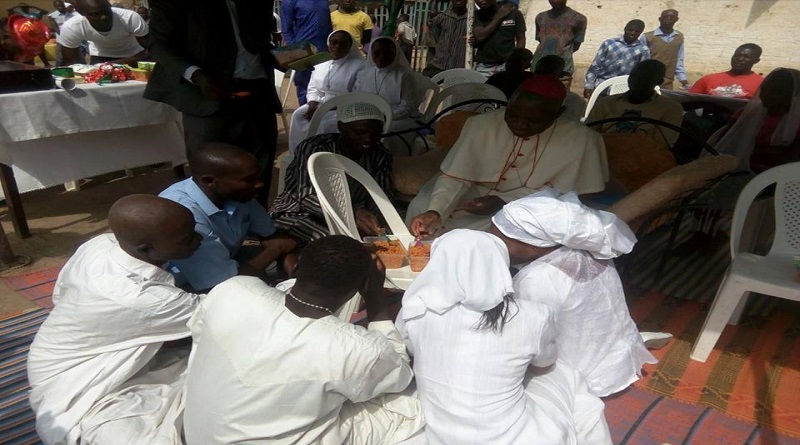The Cost of Christian Discipleship
by ARCH BISHOP · September 3, 2023
22nd Sunday, Year A, 3rd September 2023, St. Josephine Bakhita’s Pastoral Area, Jikwoyi, Abuja. Homily by Archbishop I. A. Kaigama.
Readings: Jeremiah 20:7-9; Romans 12:1-2; Matthew 16:21-27
The Cost of Christian Discipleship
It pleases me very much to be here this Sunday at St. Josephine Bakhita’s Pastoral Area, Jikwoyi, to pray with you and to urge you to hold fast to the Catholic faith as Jesus calls us to encounter Him in the sacraments and to carry our crosses after Him. As your church is situated on the way to Karshi (from the Hausa word, “karshe,” meaning “the end”), I encourage you to persevere till you reach the end in heaven. Do not mind the winding, bumpy and potholed Karshi road which sometimes has a bit of traffic congestion during rush hours. So is also the road to heaven – difficult and bumpy. That is why we are called to live in the world, but not to be defined by worldly values and inclinations.
Our readings today explain that being a disciple does not promise us immunity from suffering but assures us of eternal reward. We are called to discern and accept God’s will because as St. Paul writes in Romans 8:18, “the suffering of the present time is nothing worth comparing to the glory that is to be revealed to us.” There is no crown without a cross; there is no such thing as a “cross-less Christianity.”
The first reading revealed the inner struggle in the life and mission of the prophet Jeremiah and his firmness and bravery in the face of difficulty. He was sent by God to keep the people faithful during a difficult social and political situation. Called to prophesy at a very young age, he lamented that his message was always negative and unpopular; warning the people of violence and the dire consequences of their plan to revolt against Babylon. While the king’s advisers proclaimed the security of Judah and the long life and happiness of its king, Jeremiah prophesied the imminent fall of the kingdom. No wonder, he was regarded as a traitor. He became depressed and complained bitterly to God following the ridicule and reproach he suffered for delivering God’s word. This goes to show that the word of God convicts hearts and brings discomfort to those who dwell in sin (cf. Heb. 4:12).
Drawing from the examples of the biblical Job, the Blessed Virgin Mary, the paralytic at the pool at Bethseda, we see that those who trust in the ways of the Lord, will not go without a blessing (cf. Ps. 34:10). Those charged to preach, should not preach a cheap Christianity of miracles, wealth or only preaching to please leaders. Even our civil leaders should be courageous like the young Jeremiah to identify the challenges at various levels with every determination to address them at the roots. To say that our people are suffering now is a gross understatement. This is brought about by the very deeply entrenched culture of corruption and dishonesty at all levels including our national institutions across the different sectors.
More than the attractive packages that come with leadership positions in Nigeria, leaders must be determined to bear the burden of leadership with good cheer and strive to alleviate the sufferings of the masses. They are called to serve the poor and the needy with compassion and justice, and to work towards a more equitable and compassionate society.
In the second reading, having reminded them of God’s mercy, St. Paul urged the Christians in Rome to prove themselves generous in their self-giving to God, meaning that their lives should be an act of worship; not to conform to the sinful and futile ways of the world, but to be spiritually renewed; to be careful in discerning what is right, even when it goes against public affirmation.
The gospel text is a continuation from that of last Sunday where Peter openly confessed Jesus to be the Christ, the Son of the living God. After which Jesus plainly told them about His own death; how He would suffer grievously at the hands of the Jewish authorities, to be put to death and to rise on the third day. This did not go down well with the disciples who understood Jesus to be a conquering Messiah, a warrior king, ready to pull down and to destroy the Roman imperial forces and restore Israel to power. This led Peter to rudely interrupt Jesus and try to discourage Him from the Messianic plan, but Jesus reprimanded Peter, “get behind me Satan.” We must be careful not to give the devil an opportunity to thwart God’s noble plans for our lives (cf. Eph. 4:27).
Jesus gives us the condition for discipleship; “whosoever wants to be my disciple, must deny himself, take up his cross and follow after me” (Mt. 16:24). A disciple must deny himself, willing to say “no” to self and “yes” to God; to accept the burden of sacrifice and service for Christ’s sake to the end.
I urge you the priest in charge, Rev. Fr. Stephen Akpan, his assistant, Rev Fr. Matthias Dogo, the 177 candidates for confirmation and parishioners of St. Josephine Bakhita, Jikwoyi, to keep your hearts and minds fixed on Jesus like St. Josephine Bakhita, your Patroness, an African born in 1869 in Sudan, captured as a slave, was freed and became a Canossian Sister in Italy where she lived for 45 years. In 2000, she was declared a Saint, the first black woman to receive the honor in modern times.
Be like St. Bakhita and not allow yourself to be distracted, neither should you become a distraction to others. You will end up like her even during hardship as a Saint.




